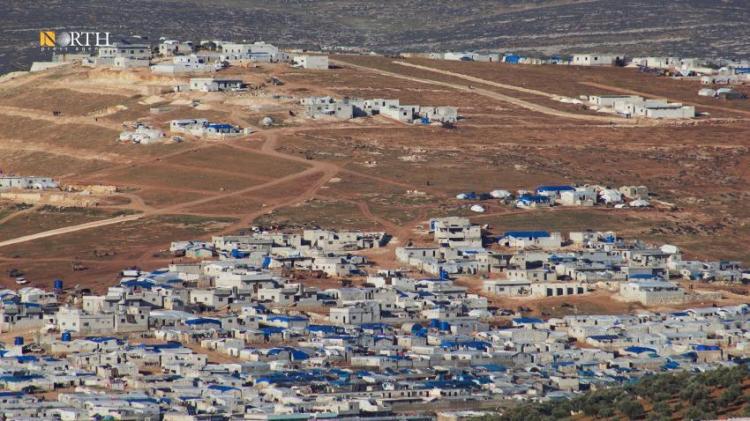IDLIB, Syria (North Press) – There are increasing fears about the spread of coronavirus inside IDP camps in Idlib, northern Syria, turning it into the new focus of the epidemic, after new cases were recorded among medical personnel in an area under Turkish control.
The camps around Idlib, where approximately one million displaced people reside, are considered a favorable environment for the epidemic due to the deterioration of the health system and the absence of the role of medical organizations, which threatens the possibility of an outbreak.
The first case of coronavirus was reported in Idlib on July 9, among medical teams in the hospital of Bab al-Hawa, which is under the control of Turkey and its affiliated groups.
Muhammad Hallaj, director of the Syria Response Coordinators team, warned of the seriousness of the situation in IDP camps, after some medical personnel in Idlib tested positive for coronavirus.
Hallaj believes that the spread of the disease would make the region a hotspot for the epidemic.
He told North Press that “the camps generally are a fertile environment for the outbreak of the virus. There is a state of fear and panic among the displaced in light of the lack of medical care, minimum medicines, and necessary sterilizers to prevent the spread of the virus."
Murhaf Jaddou, a civilian activist in Idlib, said that “the situation in the camps is well suited to the outbreak of the virus. It will be difficult to control the situation if the epidemic spreads."
Jaddou pointed out that “there is a state of panic among the displaced, especially since the tents are very close to each other. Corona[virus] has become the talk of the displaced, after recording several positive cases among medical teams in Idlib.”
Hassan Ahmad, an administrator in the Hass camp, told North Press that “the camp lacks a medical point; we don’t know if there are cases, there is no mechanism to examine them, in addition to the lack of health awareness, as the displaced don't have any awareness about the nature of the epidemic and ways to prevent it.”
He added: "Dozens of families residing in the camp share access to water from plastic tanks in the middle of the camp, and the displaced people often queue in big numbers for a long time to get water for drinking or cooking food."
“Most IDPs suffer from a shortage of water to wash their hands and take care of hygiene, in addition to the absence of sewage networks, as most families dig holes in rocky lands but they fill quickly, and sometimes overflow in the roads of the camp,” Ahmad said.
Ahmad said that “most displaced people are unable to purchase sterilization and disinfection materials because of their high prices.”
Omar Youssef, displaced from Hama countryside and living in Atlal camp, said that after recording coronavirus cases in Idlib, he bought sterile materials, masks and medical gloves, but they were very expensive.
He pointed out that "many displaced people will not be able to purchase these items at these prices."
He called on humanitarian organizations and the responsible authorities to provide sterilizers and open a medical point to avoid the spread of the epidemic.
"It will be difficult to know the affected cases and isolate them from others, if the pandemic spreads within the camps," Youssef added.
These fears coincide with the high number of COVID-19 infections in Syria. The Syrian government’s Ministry of Health recorded 496 cases, 144 of whom recovered and 25 of whom died.

